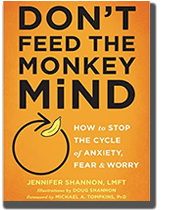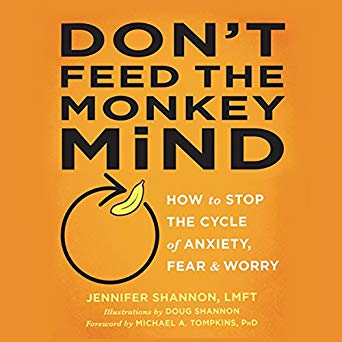Don’t Feed The Monkey Mind
 The very things we do to control anxiety can make anxiety worse. This unique guide offers a cognitive behavioral therapy (CBT)-based approach to help you recognize the constant chatter of your anxious “monkey mind,” stop feeding anxious thoughts, and find the personal peace you crave.
The very things we do to control anxiety can make anxiety worse. This unique guide offers a cognitive behavioral therapy (CBT)-based approach to help you recognize the constant chatter of your anxious “monkey mind,” stop feeding anxious thoughts, and find the personal peace you crave.
Ancient sages compared the human mind to a monkey: constantly chattering, hopping from branch to branch—endlessly moving from fear to safety. If you are one of the millions of people whose life is affected by anxiety, you are familiar with this process. Unfortunately, you can’t switch off the “monkey mind,” but you can stop feeding the monkey—or stop rewarding it by avoiding the things you fear.
Written by psychotherapist Jennifer Shannon, this book shows you how to stop anxious thoughts from taking over using proven-effective cognitive behavioral therapy (CBT), acceptance and commitment therapy (ACT), and mindfulness techniques, as well as fun illustrations. By following the exercises in this book, you’ll learn to identify your own anxious thoughts, question those thoughts, and uncover the core fears at play.
Once you stop feeding the monkey, there are no limits to how expansive your life can feel. This book will show you how anxiety can only continue as long as you try to avoid it. And, paradoxically, only by seeking out and confronting the things that make you anxious can you reverse the cycle that keeps your fears alive.
What Others are Saying…
“If you are ready to turn the tables on your anxiety, you can find no better book than Don’t Feed the Monkey Mind. Jennifer Shannon will help you turn away from the enticing tactics fearful worry and teach you how to return to the life you love.”
—Reid Wilson, Ph.D., author, Stopping the Noise in Your Head
“This book is a gem for people seeking to tame runaway anxiety and upset. Jennifer Shannon takes the simple metaphor of monkey mind and fleshes it out with wisdom and simple steps that anyone can follow. Here, in plain language, is a comprehensive set of concrete steps to let your anxiety run its course and then fade.
Jennifer Shannon has blended the best of cognitive behavioral methods and Acceptance and Commitment Therapy to produce a great contribution to the self-help literature. Here you can learn to return your energy and attention back to your voyage through life, rather than the worries and fears that have hijacked your focus. Professional psychotherapists will also find it useful. I highly recommend it!”
—David Carbonell, PhD, is a Chicago psychologist who specializes in treating fears and phobias. He is the author of Panic Attacks Workbook and The Worry Trick. He is also the “coach” at www.anxietycoach.com, a popular self-help web site.
“Don’t Feed The Monkey Mind is clear and easy to understand. The book will teach you simple and powerful strategies to harness fear and worry. Jennifer Shannon teaches you how to transform your life by taking the “monkey” out of your mind.”
—Dennis Greenberger, Ph.D., Co-author of Mind Over Mood
“Don’t Feed the Monkey Mind begins with a well-written synopsis of basic attitudes and mental habits that perpetuate anxiety. The book follows with a set of clear, concise changes in mind-set and behavioral strategies to overcome anxiety at its roots. The “monkey mind” concept is an apt, original contribution. Examples of points provided by the author as well as references to her personal story help make the book accessible to readers of all kinds.”
—Edmund J. Bourne, Ph.D., Author of The Anxiety & Phobia Workbook, Sixth Edition and Coping With Anxiety, Second Edition.
Don’t Feed the Monkey Mind
Reviewed by Tina Arnoldi @Psychcentral.com
Comparing our thought process to that of a monkey may feel a little insulting at first. We like to think that we can easily keep our thoughts under control, but the truth is that the comparison to a monkey is actually incredibly relevant.
Monkeys, as seen in a zoo or as depicted in movies, are portrayed as constantly chattering; a noise that represents what often goes on in our minds. In Don’t Feed the Monkey Mind, Jennifer Shannon offers an approach to anxious thoughts that invite us to be more accepting of our anxiety, rather than working to make it go away.
Instead of getting into the core causes of anxiety and going into the past to determine why we experience anxiety, Shannon encourages readers to instead focus on the response to what’s happening. It’s a very different approach.
Anxiety can truly be debilitating and so the desire to make it “go away” sounds appealing, but too much emphasis on getting rid of anxiety can keep people from moving forward in life. Trying to tame the monkey mind can result in a cycle of anxiety that leads one to dwelling on decisions already made, rehashing old concerns or becoming upset about things that can’t be changed. The goal of Don’t Feed the Monkey Mind is to teach people how to think and act in situations where the monkey mind is taking over.
It’s common to make attempts to avoid the feeling of anxiety through coping and safety strategies. These strategies provide a temporary reprieve, but that behavior – regardless of how maladaptive it may be – will continue to be repeated because it provided temporary relief. Avoidance or distraction prevent anxious feelings in the short term, but do not offer opportunities for new experiences because there is too much fear in taking a risk into the unknown.
Rather than attempting to flee the anxiety, Shannon writes that readers should instead walk into it with an expansive strategy that allows for overriding the experience of anxiety rather than using the short-term strategies to reduce. Expansive strategies may include making a declaration that you are choosing to live with uncertainty, or recognizing the value of living in the moment, whatever that may bring. It may entail acknowledging that judgement and criticism may come when a risk is taken, but knowing that this is where we find opportunities for growth. Whatever expansive mindset we adapt, as we practice it, the better able we are to handle all situations.
This does not deny the significance of negative feelings – they are part of life and are an indicator that something is not working well, or perhaps that we need change in a particular area. As we allow ourselves to experience negative feelings, we learn that we truly can handle them and anxiety loses its power to dictate our actions.
Shannon offers a problem-solving exercise in which rather than procrastination, people can choose to power through with a plan: identify a problem; identify four possible actions; review the short and long-term consequences of each possible action; choose one and do it and then see how it works. Simple and concrete, it is an action to work through the anxiety rather than succumbing to it. Trying not to think about the threat will only confirm it, so action is needed.
Quieting a monkey mind isn’t something that happens overnight. It requires practice and it’s helpful to start with low-risk areas. It’s important to honor effort and take credit for working with an expansive mindset, because the only thing we can control is our behavior.
Shannon’s book is written for the lay reader and is easy to understand. I appreciate that she starts the book sharing her own experience with anxiety. It gives her credibility to write as someone who’s experienced anxiety, as well as someone who treats clients as a therapist.
Don’t Feed the Monkey Mind: How to Stop the Cycle of Anxiety, Fear and Worry
Jennifer Shannon, LMFT
April, 2017
Paperback, 200 pages



